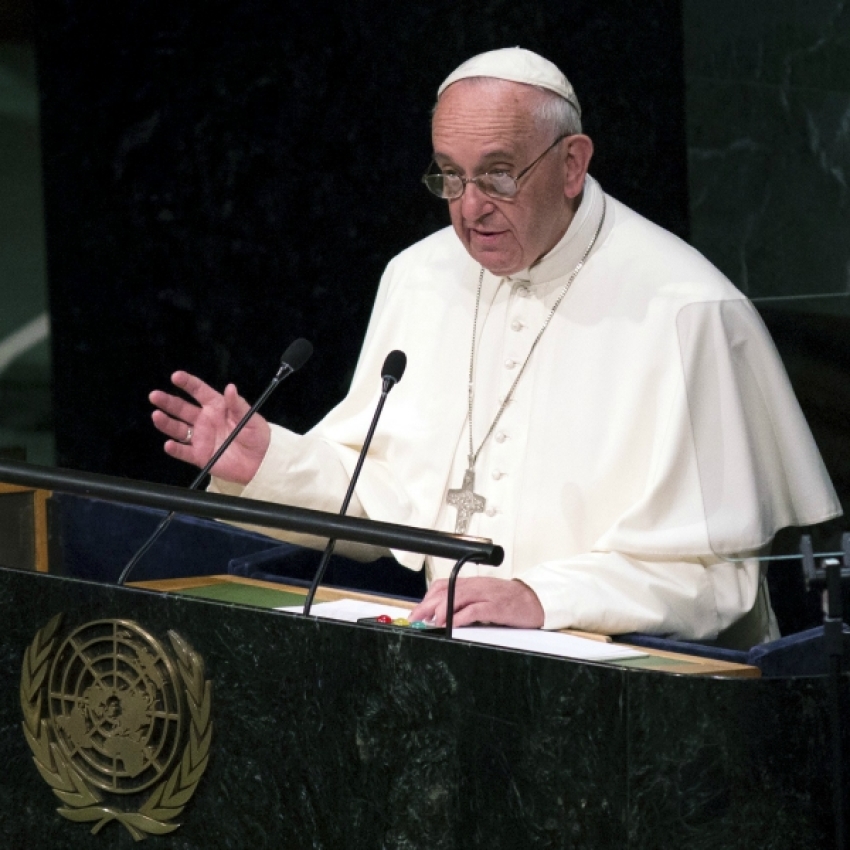Pope Francis Knocks Abortion, Christian Persecution, War and 'Anomalous Lifetyles;' Says Men and Women Are Different

NEW YORK — In a historic speech delivered at the opening of the 70th Session of the General Assembly of the United Nations Friday, Pope Francis called for a defense of the environment and a recognition and adherence to "moral law" in society while knocking abortion, war, Christian persecution and "anomalous" lifestyles.
"Man is not only a freedom which he creates for himself. Man does not create himself. He is spirit and will, but also nature. Creation is compromised where we ourselves have the final word. The misuse of creation begins when we no longer recognize any instance above ourselves. When we see nothing else but ourselves," said Francis who is the first Pope to address the opening session of the General Assembly.
"Consequently, the defense of the environment and the fight against exclusion demand that we recognize a moral law written into human nature itself. One which includes the natural difference between man and woman and the absolute respect for life in all its stages and dimensions," he said to applause.
A failure to recognize moral law, warned the Pontiff is to fight against the progression of humanity itself.
"Without the recognition of certain, incontestable, natural ethical limits and without the immediate implementation of those pillars of integral human development, the ideal of saving succeeding generations from the scourge of war and of promoting social progress and better standards of life and larger freedoms risks becoming an unattainable illusion or even worse, just idle chatter which serves as a cover for all kinds of abuse and corruption," warned Pope Francis.
Even worse he noted to applause, it could result in the "carrying out [of] an ideological colonization by the imposition of anomalous models and lifestyles which are alien to people's identity and in the end are irresponsible."
The Pontiff, who also touched on issues such as human trafficking, climate change, sexual exploitation, social and economic justice and international security, warned against war and praised the Iran nuclear deal.
"The preamble in the first Article in the Charter of the United Nations set forth the foundations of the international juridical framework — peace, pacific solution of disputes and the development of friendly relations between nations. Now, strongly opposed such statements and in practice denying them, is the constant tendency to the proliferation of arms, especially weapons of mass destruction, such a nuclear weapons," said Francis.
"There is urgent need to work for a world free of nuclear weapons in full application of the non-proliferation treaty in letter and spirit towards the goal of a complete prohibition of these weapons," he said to cheers.
"The recent agreement reached on the nuclear question in a sensitive region of Asia and the Middle East is proof of the potential of political goodwill and law exercised with sincerity, patience and constancy. I expressed my hope that this agreement will be lasting and efficacious and bring forth the desired fruits with the cooperation of all the parties involved," he continued.
While noting that it pained him to bring up the issue, Pope Francis also highlighted persecution of Christian and general religious minorities in the Middle East and Africa.
"I must bring you my repeated appeals regarding the painful situation of the entire Middle East, North Africa, and other African countries who are Christians together with other cultural or ethnic groups, and even members of the majority religion who have no desire to be caught up in hatred and folly," said Francis.
"[They] have been forced to witness the destruction of the places of worship, their cultural and religious heritage, their houses and property and to face the alternative either of fleeing or paying to go into peace, by their own lives or by enslavement," he continued.
"These realities should serve as a grave summons to an examination of conscience on the part of those charged with the conduct of international affairs. (Albeit) not only in cases of religious or cultural persecution but in every situation of conflict as in Ukraine, Syria, Iraq, Libya, South Sudan and the Great Lakes region," he noted.
"Real human beings take precedence over partisan interests however legitimate the matter may be in wars and conflict there are individual persons, our brothers and sisters. Men and women, young and old, boys and girls, who weep, suffer and die. Human beings who are easily discarded when our only response is to draw up lists of problems, strategies and disagreements," he said.
"As I wrote in my letter to the Secretary General of the United Nations on the 9th of August 2014, the most basic understanding of human dignity compels the international community particularly through the norms and mechanisms of international law to do all that it can to stop and to prevent further systematic violence against ethnic and religious minorities and to protect innocent peoples," he added.



























